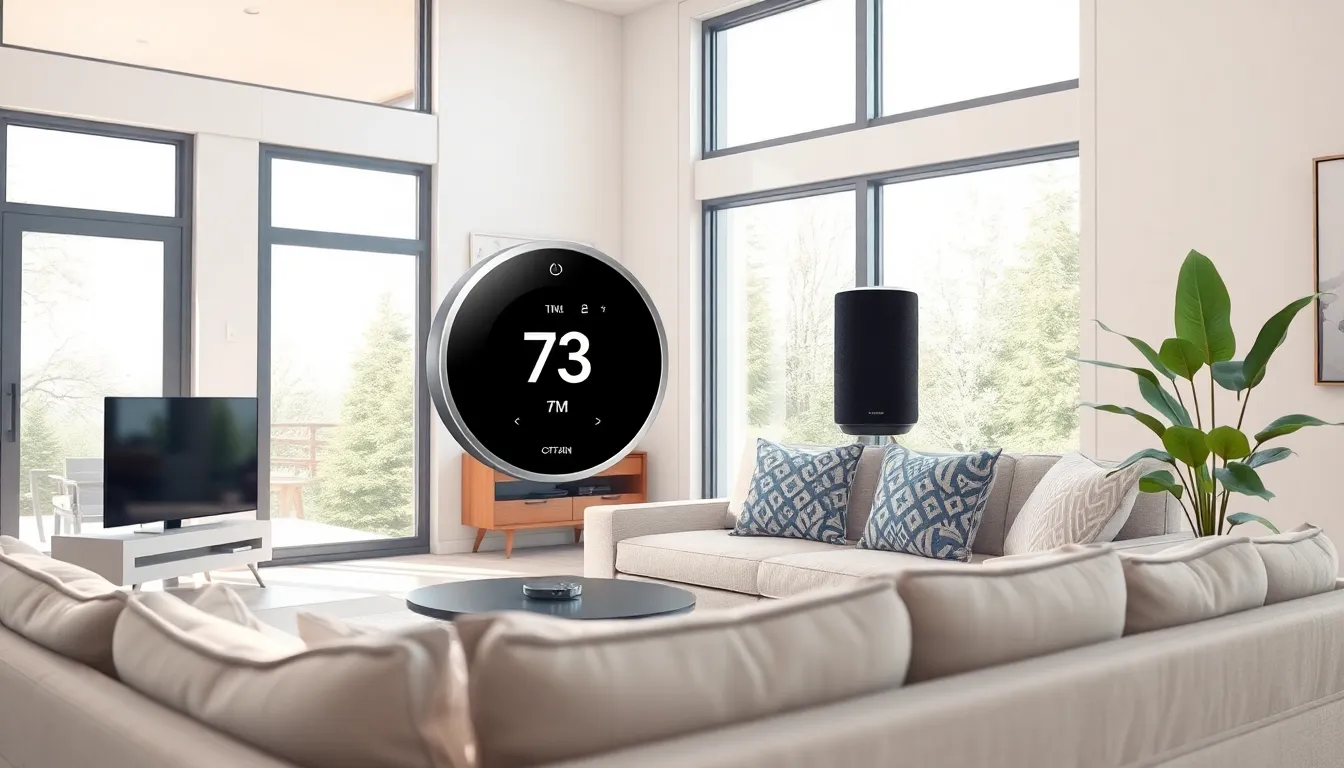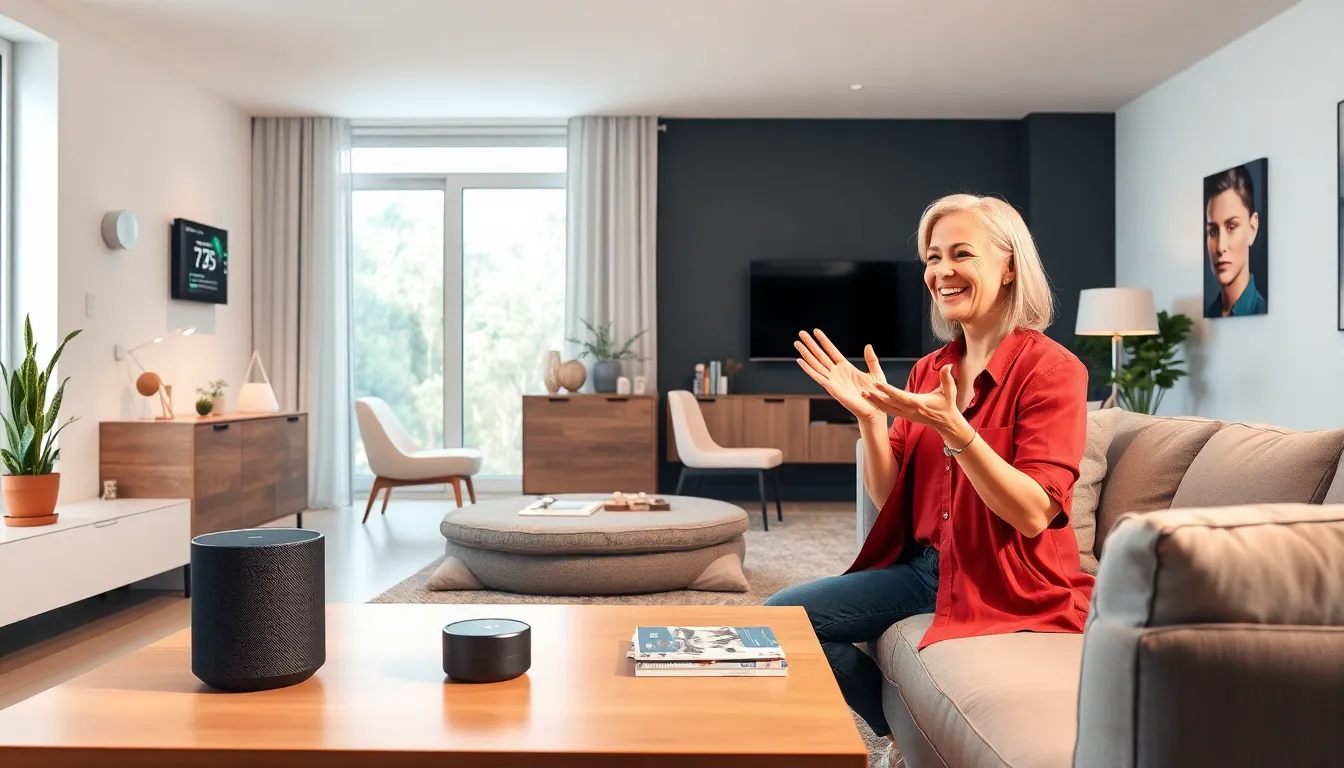Table of Contents
ToggleImagine waking up to a home that knows you better than your best friend. An AI-driven home isn’t just a futuristic dream; it’s quickly becoming a reality that blends convenience with a sprinkle of magic. From adjusting the thermostat while you snooze to brewing your morning coffee just as you like it, these smart systems are here to make life easier and a bit more fun.
Gone are the days of fumbling with remotes and switches. With AI at the helm, homes can learn your habits, anticipate your needs, and even tell a joke or two when the mood strikes. As technology evolves, so does the way we live, making everyday tasks feel like a scene from a sci-fi movie. Dive into the world of AI-driven homes and discover how they’re transforming the mundane into the extraordinary.
Overview of AI-Driven Homes
AI-driven homes represent a significant shift in how technology integrates into daily life. These smart environments utilize advanced algorithms to tailor experiences to individual preferences. For instance, AI systems can learn daily routines, making the home environment more responsive.
Energy management benefits greatly from AI integration. Smart thermostats adapt to users’ habits, optimizing energy use while maintaining comfort. Security systems equipped with AI analyze patterns and detect unusual activity, enhancing safety measures around the home.
Automation in AI-driven homes streamlines everyday chores. Devices like smart speakers act as central hubs, controlling lighting, appliances, and entertainment systems. Kitchen appliances can coordinate meal preparation, ensuring that dishes are cooked to perfection.
User control remains integral in these systems. Voice commands allow residents to manage their smart environments hands-free. Mobile applications provide additional convenience, enabling remote monitoring and adjustments from anywhere.
Incorporating AI accelerates efficiency and enhances lifestyle. Caregivers utilize AI-driven solutions for elderly patients, enabling them to live independently while receiving necessary support. Integration with smart home devices promotes seamless connectivity, creating a comprehensive living experience.
The future of AI-driven homes promises continual evolution. Emerging technologies, such as machine learning, aim to refine these systems further, making them even more intuitive. As awareness grows, so does the potential to change how individuals interact with home technology daily.
Benefits of AI-Driven Homes

AI-driven homes offer a myriad of benefits, transforming everyday living into a streamlined experience that prioritizes convenience and efficiency.
Enhanced Security Features
Enhanced security features in AI-driven homes provide unparalleled peace of mind. These systems utilize AI technology to analyze patterns and detect unusual activities. Surveillance cameras equipped with facial recognition capabilities allow for quick identification of visitors. Intruder alerts generate immediate notifications to homeowners, facilitating prompt responses. Integration with smart locks enables remote access control, ensuring safety when users are away. Homeowners can monitor their properties in real time through mobile applications, enabling comprehensive oversight. As a result, individuals experience a sense of security once thought to be the stuff of science fiction.
Energy Efficiency Improvements
Energy efficiency improvements stem from the intelligent management of resources in AI-driven homes. Smart thermostats adjust heating and cooling based on occupancy patterns, significantly reducing energy consumption. Household appliances, when connected to the AI ecosystem, optimize performance, promoting sustainable usage. Monitoring energy usage through detailed reports reveals trends, helping homeowners understand consumption better. This real-time data encourages informed decision-making around energy savings. Overall, these advances contribute to lower utility bills while supporting environmental sustainability goals.
Technologies Behind AI-Driven Homes
AI-driven homes rely on various advanced technologies that enhance everyday living. These innovations improve convenience, security, and energy management.
Smart Home Devices
Smart home devices serve as essential components of AI-driven environments. Smart speakers act as central hubs, allowing users to control everything from lighting to temperature. Smart thermostats learn user preferences and adjust settings automatically. Security features include AI-powered cameras that provide real-time alerts for unusual activity. Connected appliances streamline chores by enabling remote control, promoting a seamless living experience. Smart plugs contribute by ensuring energy efficiency, turning devices off when not in use.
AI Algorithms and Machine Learning
AI algorithms form the backbone of intelligent home systems. These algorithms analyze data from various sources to learn user habits and predict needs. Machine learning enhances system adaptability, allowing it to improve over time. For instance, AI learns preferred temperature settings based on historical behavior, adjusting for optimal comfort. Algorithms also power security systems that detect patterns of unusual activity, providing timely alerts to homeowners. The ongoing refinement of these technologies promises even more intuitive interactions in the future.
Challenges and Concerns
AI-driven homes face notable challenges and concerns. Privacy issues represent a primary concern, as smart devices often collect vast amounts of personal data. Users may worry about unauthorized access to sensitive information. Instances of data breaches in the past highlight the need for robust security measures. Protection mechanisms must keep pace with technological advancements to ensure user trust.
Implementation costs also pose significant challenges. High initial expenses for installing AI systems can deter potential users. Smart appliances, security systems, and advanced home automation require substantial financial investment. Although long-term savings exist through energy efficiency, upfront costs remain a barrier. Potential homeowners must weigh these costs against the benefits of adopting AI-driven technologies.
Future of AI-Driven Homes
AI-driven homes are set to redefine daily living through increased connectivity and automation. These systems leverage advanced algorithms, which enhance adaptability by learning user preferences over time. Intelligent technologies will facilitate seamless interactions between devices, transforming ordinary settings into tailored environments.
In terms of security, advancements in AI will continue to bolster safety features. Homeowners can expect real-time alerts from AI-equipped surveillance cameras and smart locks, ensuring a proactive approach to safety. The emphasis on privacy protection remains critical, prompting manufacturers to develop robust security measures that safeguard personal data.
Energy efficiency will witness significant improvements as well. Smart thermostats and connected appliances utilize data analytics for optimized energy consumption, leading to lower utility costs. Homeowners can anticipate additional savings when employing these technologies, given their growing focus on sustainability.
Device integration is another area of evolution. Smart speakers are becoming central hubs that manage various tasks, from controlling lighting to assisting in daily schedules. As the technology matures, voice recognition and automation will enhance user experience, making interactions more intuitive and user-friendly.
Challenges persist, with implementation costs being a common barrier. The initial investment for smart home systems can be substantial, which may deter some homeowners. However, long-term advantages through energy savings and enhanced lifestyles potentially outweigh these upfront expenses.
Overall, the future of AI-driven homes looks promising. Continuous technological advancements will lead to smarter, more efficient living environments that prioritize comfort and security. This transformation signals a new era where home technology becomes an integral part of everyday life.
AI-driven homes are revolutionizing the way individuals experience daily living. With their ability to learn preferences and automate tasks they offer unmatched convenience and efficiency. As technology continues to advance these smart systems will become even more intuitive and integrated into everyday life.
The benefits of enhanced security and energy efficiency are significant. Homeowners can enjoy peace of mind while also reducing utility costs. While challenges like privacy concerns and initial investment costs exist the long-term advantages are likely to outweigh these obstacles.
Ultimately AI-driven homes represent a future where technology seamlessly blends into the fabric of daily routines making life not only easier but also more enjoyable. As this trend evolves it will be exciting to see how these innovations shape the way people interact with their living spaces.



